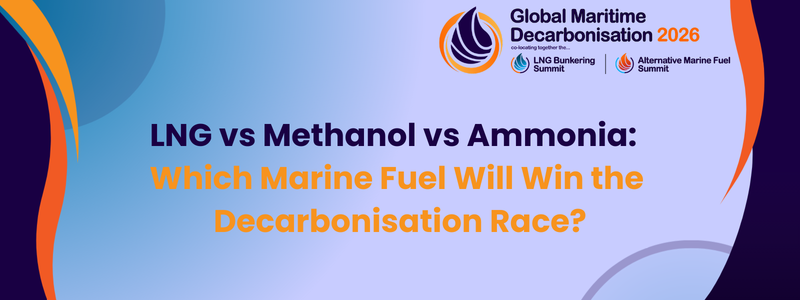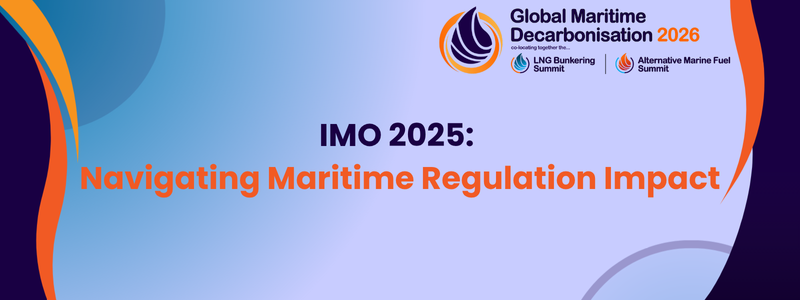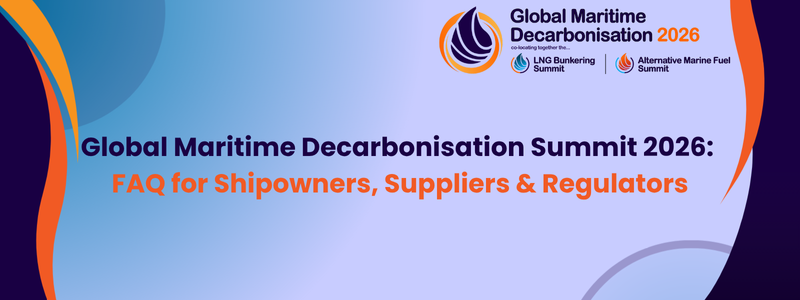Global Maritime Decarbonisation Summit Blog
LNG vs Methanol vs Ammonia: Which Marine Fuel Will Win the Decarbonisation Race?

Discover the future of marine fuel decarbonisation as LNG, methanol, and ammonia compete to reduce shipping emissions. Explore clean fuel alternatives now.
IMO 2025: Navigating Maritime Regulation Impact

As the world grapples with the realities of climate change, regulatory bodies like the IMO play a crucial role in steering industries towards sustainable practices. With the arrival of the IMO 2025 regulations meeting this past October, the maritime industry stood on the brink of transformative change.
Global Maritime Decarbonisation Summit 2026: FAQ for Shipowners, Suppliers & Regulators

Why is global maritime decarbonisation so important right now?
This FAQ explores what that leadership looks like in practice: how to navigate the evolving regulatory changes, where to invest for compliance and competitiveness, and which technologies and fuels are emerging as the strongest options for a viable, low-carbon future.
The Calm Before the Storm: How to Prepare for Mid-Term Measures

Decarbonisation is reshaping the global shipping landscape, and operators must act now to ensure they’re ready for this cleaner, greener future. From emissions reporting, fuel choice, vessel technology and digitalisation, the challenges are significant – but so are the opportunities.
Future Fuels & Marine Gas - Decarbonising the Maritime Industry

This week we are diving straight into how the industry is currently using future fuels and marine gas to drive the decarbonisation of the global maritime industry.
LNG Bunkering & Future Fuel Global Summit 2024 - Speaker Showcase!

This week we are diving straight into a showcase of four of our speakers from our 2024 line-up. To discover the complete speaker roster and explore all the sessions at the summit, please click here.
The LNG Bunkering & Future Fuel Global Summit 2024 Agenda has arrived!

We are excited and delighted to be sharing the first official copy of the LNG Bunkering and Future Fuels Global Summit 2024 Agenda. This highly anticipated and essential forum for leaders across the Maritime industry will be held at the Novotel City Amsterdam from the 14th - 16th May.
LNG Bunkering & Future Fuel Global Summit 2023 Post Show Report

Uncover the highlights from the 10th edition of the LNG Bunkering & Future Fuel Global Summit - the world’s most established LNG Bunkering gathering!
Are LNG, Hydrogen, and Electricity the Key to Sustainable Ship Transportation and Decarbonisation in the Maritime Industry?

Dive into this exclusive case study with Dain Detillier, Executive Vice President LNG Operations, Harvey Gulf International Marine, on the rising popularity of LNG as a cleaner fuel option.
Could LNG be Europe’s energy solution to Russian gas restrictions?

Ahead of the LNG Bunkering Global Summit 2022, we highlight the dangers of heavy-fuel energy dependency from the West and discuss whether Liquefied Natural Gas (LNG) could be a viable alternative energy provider for Europe amid the conflict in Ukraine, to help you drive decarbonisation of the global shipping industry.
Read our exclusive blog below!
DOWNLOAD THE 2022 LNG BUNKERING AGENDA
2020 Global Market Trends

The Liquefied Natural Gas (LNG) market is globalising as buyers, seller numbers and types expand. Ahead of the Global LNG Bunkering Summit 2020, Oil and Gas IQ surveyed leading industry professionals on the current state of the LNG market, major growth drivers and key industry trends. The results have been complied into the following report with additional commentary from Harly Penner, Director, Fleet Engineering & Vessel Development, Seaspan Ferries, to highlight the new regional opportunities and solutions to industry challenges detailing how they are changing, why, and how participants should react.
Understanding Sustainable Shipping

The Fuel of the Future

In this Blog we hear from Tom Stuchfield, Editor of Oil & Gas IQ, discuss the question of whether or not liquefied natural gas, or LNG, is a desirable – or even viable – fuel for the future. With contributions from Mark Cann of Cryo Energy Tech and Senior Energy Analyst of Yalova University, Omid Shokri, they examine the factors that make LNG appealing to some and unappealing to others, the current and future plans for infrastructure, and a projection for the coming years.
Follow the excerpt below to learn about
- Rules and regulations
- The sulphur cap
- Cost and safety
- Environmental concerns
- Forecasts






